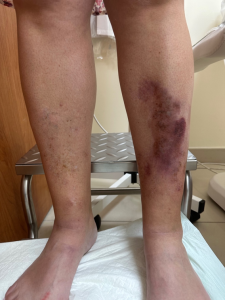VENOUS ECZEMA, also known as stasis dermatitis, common in people with varicose veins, is a chronic skin condition found on the lower legs and around the ankles. The affected skin changes into pink, red, or brown and becomes dry, crusted, blistered, and sometimes itchy.
There may be periods when these symptoms improve and periods when they are more severe. Your legs may become swollen, especially at the end of the day or after long periods of standing, with varicose veins often visible on the superficial skin of your legs. If varicose veins and the underlying cause of venous reflux under the skin are left untreated for a long time, a leg ulcer or non-healing wound may develop.
Some people may also complain of leg pain, tenderness, and tightness, and their skin becomes hardened (lipodermatosclerosis) or may develop small white scars (atrophy blanche).
Venous eczema is usually caused by increased venous pressure in the leg veins. As a result, valves in the veins do not open and close properly, making it difficult for blood to be pushed towards the heart against gravity and can leak backward down your legs. This condition can cause fluid to leak into the surrounding tissue, causing inflammation in your leg.
Some people develop venous eczema for no obvious reason. In contrast, others are affected with this condition due to some predispositions or risk factors such as family history of deep vein thrombosis or venous insufficiency, pregnancy, obesity, sedentary lifestyle, and getting older or being a woman increase the chance of this happening.

Traditional treatment involving a combination of emollient creams, topical corticosteroids, or pleiotropic medications plus leg compression with elastic stockings may temporarily help to soothe the signs and symptoms. However, it does not eliminate the underlying cause, venous back blood flow known as hidden varicose veins. If not appropriately treated, the venous eczema usually progresses, and it can lead to further skin damage or even leg ulcer formation.
Venous eczema can be cured, provided that it is diagnosed and treated by an expert in varicose veins and venous disease. If you experience symptoms of varicose eczema, you should see our vascular specialist, who will be able to make a diagnosis and provide options for varicose veins treatment to determine whether you have a problem with the blood flow in your leg, as this is the leading cause of varicose eczema.
For more information about the above treatments or to book your consultation with Dr. Marek Sepiolo, please call +971524394908 or email info@evclinic.ae

